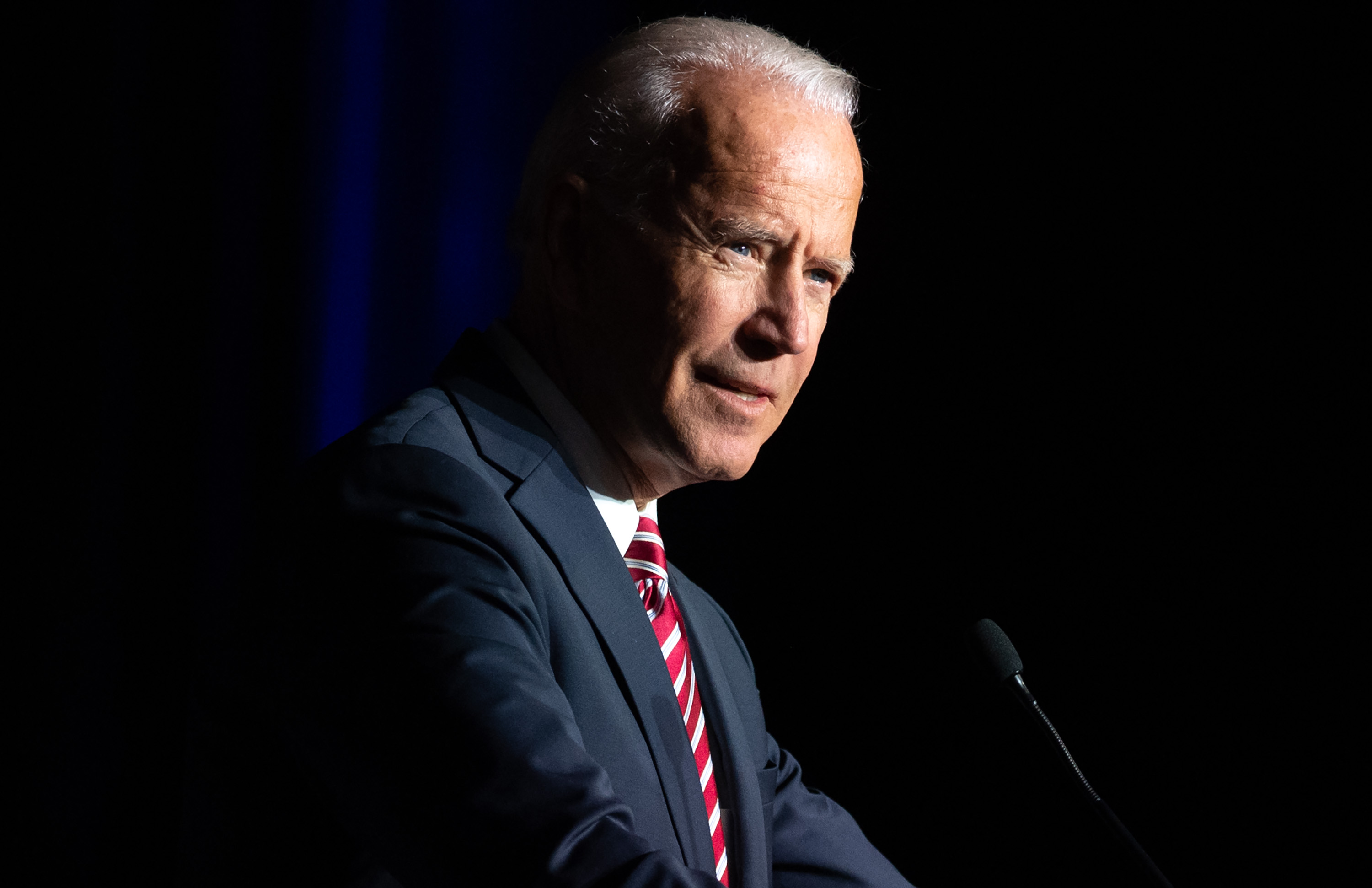Joe Biden and the end of neoliberalism
If Biden wins the nomination, the 2020 contest will be the last of its kind


A free daily email with the biggest news stories of the day – and the best features from TheWeek.com
You are now subscribed
Your newsletter sign-up was successful
Until Joe Biden announced his 2020 candidacy, it was possible to believe that the Democratic Party was poised to shift leftward heading into the upcoming presidential race, readying itself to challenge President Trump's right-wing cultural populism with a progressive populism of its own. The only question was whether it would take a primarily economic form — as Sens. Bernie Sanders (I-Vt.) and Elizabeth Warren (D-Mass.) favored — or also emphasize culture war issues and identity politics — as Sen. Kamala Harris (D-Calif.), South Bend Mayor Pete Buttigieg, and most of the other Democratic candidates would prefer.
But since Biden declared his candidacy, these expectations have been thoroughly scuttled. Despite Biden's very long track record of middle-of-the-road — and sometimes downright conservative — positions on economics, crime, race, and foreign policy, he leads his nearly two-dozen rivals by a considerable margin in poll after poll. In most polls, he doubles the perpetually second-place Sanders. And those who are supporting Biden appear to be doing so with their eyes wide open. They like him, they think he can beat Trump, and they can obviously live with the policy implications.
That tells us something important and surprising about the current character of the Democratic Party.
The Week
Escape your echo chamber. Get the facts behind the news, plus analysis from multiple perspectives.

Sign up for The Week's Free Newsletters
From our morning news briefing to a weekly Good News Newsletter, get the best of The Week delivered directly to your inbox.
From our morning news briefing to a weekly Good News Newsletter, get the best of The Week delivered directly to your inbox.
Until Tuesday, it was possible to assume most of these early Biden supporters were low-information voters who are paying little attention to the race and naming the former vice president and senator to pollsters mainly because they are familiar with him. But the new Quinnipiac poll indicates that, on the contrary, by far the largest portion of those who are paying "a lot" of attention to the contest (42 percent of them) support Biden. Sanders, meanwhile, has only 8 percent of those who are most engaged and the greatest portion, 28 percent, of those who are paying "little or no" attention.
If Biden maintains his frontrunner status through this summer's debates and benefits as the first candidates drop out (in the Quinnipiac poll, 17 candidates are polling at or below 1 percent, so some are bound to quit soon), it will be a powerful sign that the party has resolved to take its stand against Trumpian populism in the name of neoliberalism — the centrist, technocratic ideology that powered the presidency of Bill Clinton, informed the Obama administration, and guided Hillary Clinton through her two presidential campaigns.
Whatever the outcome of such a contest, it is likely to be the last of its kind.
Let's begin with the darkest scenario for the Democrats: Biden wins the nomination, provoking a third-party run by someone who rallies the disaffected left wing of the party. In the process, this challenge from the left takes votes from the party's nominee, who is then defeated in November 2020. While a handful of starry-eyed socialists might support such a move in the hopes that this left-wing challenger could defeat both Biden and Trump, the reality is that this would be a kamikaze run, intended to torpedo an unacceptably neoliberal nominee. If it worked, the lesson learned by everyone would be that the left wing of the party is too large and restive to countenance another nominee like Biden, who turned out not to be electable at all. The era of neoliberal nominees would be recognized by everyone to be over.
A free daily email with the biggest news stories of the day – and the best features from TheWeek.com
There's another possibility: Biden wins the nomination, the left grumbles and gets even nastier than normal on Twitter but ultimately comes around in grudging support of the campaign out of an overriding desire to defeat the racist, would-be fascist in the White House. This would be a bitter pill to swallow, but for all of the left's fiery rhetoric and grand ambitions, it's shown a pragmatic side in the past and may well do so again once confronted with a choice between Biden and a second term for Trump.
This scenario would end in one of two ways: If Biden were to lose, the recriminations would make the battles stirred up by the Clinton-Sanders smackdown of 2016 look like a good-natured spat between the best of friends. The left would demand blood, and the revolution would claim a lot of victims. It would be the most eventful and portentous intra-Democratic feud since the faction supporting George McGovern's candidacy in 1972 wrested control of the party away from the Cold War liberals. This time it would be neoliberal heads on spikes and the millennial left demanding reform of the party from top to bottom.
But what if Biden were to win the nomination and then defeat Trump? Wouldn't that validate the conviction of so many establishment and rank-and-file Democrats that neoliberalism is the default ideology of a country increasingly clustering in the center left? Wouldn't it ensure that this ideology maintains its hold over the party going forward?
Don't bet on it.
Neoliberalism is under assault around the world — by the right, but also by the young, who long for something beyond what they see as its consensus-focused complacency and accommodationism. This is a generational battle. Biden's supporters are old; the young favor the far more left-wing Sanders or Warren. It's only a matter of time before those who gravitate to neoliberalism pass away, making room for the more activist faction of the party.
This is all the more so because a Biden presidency is unlikely to vindicate neoliberal hopes for a return to "normalcy" — by which the candidate appears to mean bipartisan comity yielding moderate, market-driven policy outcomes that members of both parties can applaud. Bill Clinton was ready to compromise with Republicans on just about anything. They still despised him. Just as they demonized Barack Obama. And that was before the party remade itself in Trump's fire-breathing, omni-belligerent image. Post-Trump Republicans will do everything they can to make Biden a failed president so that they can regain power as quickly as possible. That will make neoliberal equability look an awful lot like impotence.
Joe Biden may or may not prevail in his bid for the presidency. But either way, neoliberalism is preparing for its last stand.
Damon Linker is a senior correspondent at TheWeek.com. He is also a former contributing editor at The New Republic and the author of The Theocons and The Religious Test.
-
 The environmental cost of GLP-1s
The environmental cost of GLP-1sThe explainer Producing the drugs is a dirty process
-
 Greenland’s capital becomes ground zero for the country’s diplomatic straits
Greenland’s capital becomes ground zero for the country’s diplomatic straitsIN THE SPOTLIGHT A flurry of new consular activity in Nuuk shows how important Greenland has become to Europeans’ anxiety about American imperialism
-
 ‘This is something that happens all too often’
‘This is something that happens all too often’Instant Opinion Opinion, comment and editorials of the day
-
 The ‘mad king’: has Trump finally lost it?
The ‘mad king’: has Trump finally lost it?Talking Point Rambling speeches, wind turbine obsession, and an ‘unhinged’ letter to Norway’s prime minister have caused concern whether the rest of his term is ‘sustainable’
-
 The billionaires’ wealth tax: a catastrophe for California?
The billionaires’ wealth tax: a catastrophe for California?Talking Point Peter Thiel and Larry Page preparing to change state residency
-
 Bari Weiss’ ‘60 Minutes’ scandal is about more than one report
Bari Weiss’ ‘60 Minutes’ scandal is about more than one reportIN THE SPOTLIGHT By blocking an approved segment on a controversial prison holding US deportees in El Salvador, the editor-in-chief of CBS News has become the main story
-
 Memo signals Trump review of 233k refugees
Memo signals Trump review of 233k refugeesSpeed Read The memo also ordered all green card applications for the refugees to be halted
-
 Has Zohran Mamdani shown the Democrats how to win again?
Has Zohran Mamdani shown the Democrats how to win again?Today’s Big Question New York City mayoral election touted as victory for left-wing populists but moderate centrist wins elsewhere present more complex path for Democratic Party
-
 Millions turn out for anti-Trump ‘No Kings’ rallies
Millions turn out for anti-Trump ‘No Kings’ ralliesSpeed Read An estimated 7 million people participated, 2 million more than at the first ‘No Kings’ protest in June
-
 Democrats: Harris and Biden’s blame game
Democrats: Harris and Biden’s blame gameFeature Kamala Harris’ new memoir reveals frustrations over Biden’s reelection bid and her time as vice president
-
 ‘We must empower young athletes with the knowledge to stay safe’
‘We must empower young athletes with the knowledge to stay safe’Instant Opinion Opinion, comment and editorials of the day
